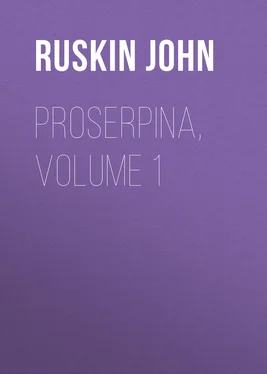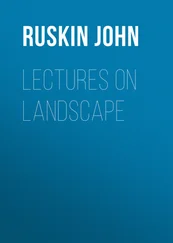John Ruskin - Proserpina, Volume 1
Здесь есть возможность читать онлайн «John Ruskin - Proserpina, Volume 1» — ознакомительный отрывок электронной книги совершенно бесплатно, а после прочтения отрывка купить полную версию. В некоторых случаях можно слушать аудио, скачать через торрент в формате fb2 и присутствует краткое содержание. Жанр: foreign_antique, Биология, literature_19, foreign_edu, на английском языке. Описание произведения, (предисловие) а так же отзывы посетителей доступны на портале библиотеки ЛибКат.
- Название:Proserpina, Volume 1
- Автор:
- Жанр:
- Год:неизвестен
- ISBN:нет данных
- Рейтинг книги:3 / 5. Голосов: 1
-
Избранное:Добавить в избранное
- Отзывы:
-
Ваша оценка:
- 60
- 1
- 2
- 3
- 4
- 5
Proserpina, Volume 1: краткое содержание, описание и аннотация
Предлагаем к чтению аннотацию, описание, краткое содержание или предисловие (зависит от того, что написал сам автор книги «Proserpina, Volume 1»). Если вы не нашли необходимую информацию о книге — напишите в комментариях, мы постараемся отыскать её.
Proserpina, Volume 1 — читать онлайн ознакомительный отрывок
Ниже представлен текст книги, разбитый по страницам. Система сохранения места последней прочитанной страницы, позволяет с удобством читать онлайн бесплатно книгу «Proserpina, Volume 1», без необходимости каждый раз заново искать на чём Вы остановились. Поставьте закладку, и сможете в любой момент перейти на страницу, на которой закончили чтение.
Интервал:
Закладка:
16. There is one very unusual condition of the root-stock which has become of much importance in economy, though it is of little in botany; the forming, namely, of knots at the ends of the branches of the underground stem, where the new roots are to be thrown out. Of these knots, or 'tubers,' (swollen things,) one kind, belonging to the tobacco tribe, has been singularly harmful, together with its pungent relative, to a neighbouring country of ours, which perhaps may reach a higher destiny than any of its friends can conceive for it, if it can ever succeed in living without either the potato, or the pipe.
17. Being prepared now to find among plants many things which are like roots, yet are not; you may simplify and make fast your true idea of a root as a fibre or group of fibres, which fixes, animates, and partly feeds the leaf. Then practically, as you examine plants in detail, ask first respecting them: What kind of root have they? Is it large or small in proportion to their bulk, and why is it so? What soil does it like, and what properties does it acquire from it? The endeavour to answer these questions will soon lead you to a rational inquiry into the plant's history. You will first ascertain what rock or earth it delights in, and what climate and circumstances; then you will see how its root is fitted to sustain it mechanically under given pressures and violences, and to find for it the necessary sustenance under given difficulties of famine or drought. Lastly you will consider what chemical actions appear to be going on in the root, or its store; what processes there are, and elements, which give pungency to the radish, flavour to the onion, or sweetness to the liquorice; and of what service each root may be made capable under cultivation, and by proper subsequent treatment, either to animals or men.
18. I shall not attempt to do any of this for you; I assume, in giving this advice, that you wish to pursue the science of botany as your chief study; I have only broken moments for it, snatched from my chief occupations, and I have done nothing myself of all this I tell you to do. But so far as you can work in this manner, even if you only ascertain the history of one plant, so that you know that accurately, you will have helped to lay the foundation of a true science of botany, from which the mass of useless nomenclature, 17 17 The only use of a great part of our existing nomenclature is to enable one botanist to describe to another a plant which the other has not seen. When the science becomes approximately perfect, all known plants will be properly figured, so that nobody need describe them; and unknown plants be so rare that nobody will care to learn a new and difficult language, in order to be able to give an account of what in all probability he will never see.
now mistaken for science, will fall away, as the husk of a poppy falls from the bursting flower.
CHAPTER III.
THE LEAF
1. In the first of the poems of which the English Government has appointed a portion to be sung every day for the instruction and pleasure of the people, there occurs this curious statement respecting any person who will behave himself rightly: "He shall be like a tree planted by the river side, that bears its fruit in its season. His leaf also shall not wither; and you will see that whatever he does will prosper."
I call it a curious statement, because the conduct to which this prosperity is promised is not that which the English, as a nation, at present think conducive to prosperity: but whether the statement be true or not, it will be easy for you to recollect the two eastern figures under which the happiness of the man is represented,—that he is like a tree bearing fruit "in its season;" (not so hastily as that the frost pinch it, nor so late that no sun ripens it;) and that "his leaf shall not fade." I should like you to recollect this phrase in the Vulgate—"folium ejus non defluet"—shall not fall away ,—that is to say, shall not fall so as to leave any visible bareness in winter time, but only that others may come up in its place, and the tree be always green.
2. Now, you know, the fruit of the tree is either for the continuance of its race, or for the good, or harm, of other creatures. In no case is it a good to the tree itself. It is not indeed, properly, a part of the tree at all, any more than the egg is part of the bird, or the young of any creature part of the creature itself. But in the leaf is the strength of the tree itself. Nay, rightly speaking, the leaves are the tree itself. Its trunk sustains; its fruit burdens and exhausts; but in the leaf it breathes and lives. And thus also, in the eastern symbolism, the fruit is the labour of men for others; but the leaf is their own life. "He shall bring forth fruit, in his time; and his own joy and strength shall be continual."
3. Notice next the word 'folium.' In Greek, φυλλον, 'phyllon.'
"The thing that is born," or "put forth." "When the branch is tender, and putteth forth her leaves, ye know that summer is nigh." The botanists say, "The leaf is an expansion of the bark of the stem." More accurately, the bark is a contraction of the tissue of the leaf. For every leaf is born out of the earth, and breathes out of the air; and there are many leaves that have no stems, but only roots. It is 'the springing thing'; this thin film of life; rising, with its edge out of the ground—infinitely feeble, infinitely fair. With Folium, in Latin, is rightly associated the word Flos; for the flower is only a group of singularly happy leaves. From these two roots come foglio, feuille, feuillage, and fleur;—blume, blossom, and bloom; our foliage, and the borrowed foil, and the connected technical groups of words in architecture and the sciences.
4. This thin film, I said. That is the essential character of a leaf; to be thin,—widely spread out in proportion to its mass. It is the opening of the substance of the earth to the air, which is the giver of life. The Greeks called it, therefore, not only the born or blooming thing, but the spread or expanded thing—"πεταλον." Pindar calls the beginnings of quarrel, "petals of quarrel." Recollect, therefore, this form, Petalos; and connect it with Petasos, the expanded cap of Mercury. For one great use of both is to give shade. The root of all these words is said to be ΠΕΤ(Pet), which may easily be remembered in Greek, as it sometimes occurs in no unpleasant sense in English.
5. But the word 'petalos' is connected in Greek with another word, meaning, to fly,—so that you may think of a bird as spreading its petals to the wind; and with another, signifying Fate in its pursuing flight, the overtaking thing, or overflying Fate. Finally, there is another Greek word meaning 'wide,' πλατυς (platys); whence at last our 'plate'—a thing made broad or extended—but especially made broad or 'flat' out of the solid, as in a lump of clay extended on the wheel, or a lump of metal extended by the hammer. So the first we call Platter; the second Plate, when of the precious metals. Then putting b for p , and d for t , we get the blade of an oar, and blade of grass.
6. Now gather a branch of laurel, and look at it carefully. You may read the history of the being of half the earth in one of those green oval leaves—the things that the sun and the rivers have made out of dry ground. Daphne—daughter of Enipeus, and beloved by the Sun,—that fable gives you at once the two great facts about vegetation. Where warmth is, and moisture—there, also, the leaf. Where no warmth—there is no leaf; where there is no dew—no leaf.
7. Look, then, to the branch you hold in your hand. That you can so hold it, or make a crown of it, if you choose, is the first thing I want you to note of it;—the proportion of size, namely, between the leaf and you . Great part of your life and character, as a human creature, has depended on that. Suppose all leaves had been spacious, like some palm leaves; solid, like cactus stem; or that trees had grown, as they might of course just as easily have grown, like mushrooms, all one great cluster of leaf round one stalk. I do not say that they are divided into small leaves only for your delight, or your service, as if you were the monarch of everything—even in this atom of a globe. You are made of your proper size; and the leaves of theirs: for reasons, and by laws, of which neither the leaves nor you know anything. Only note the harmony between both, and the joy we may have in this division and mystery of the frivolous and tremulous petals, which break the light and the breeze,—compared to what with the frivolous and tremulous mind which is in us, we could have had out of domes, or penthouses, or walls of leaf.
Читать дальшеИнтервал:
Закладка:
Похожие книги на «Proserpina, Volume 1»
Представляем Вашему вниманию похожие книги на «Proserpina, Volume 1» списком для выбора. Мы отобрали схожую по названию и смыслу литературу в надежде предоставить читателям больше вариантов отыскать новые, интересные, ещё непрочитанные произведения.
Обсуждение, отзывы о книге «Proserpina, Volume 1» и просто собственные мнения читателей. Оставьте ваши комментарии, напишите, что Вы думаете о произведении, его смысле или главных героях. Укажите что конкретно понравилось, а что нет, и почему Вы так считаете.












